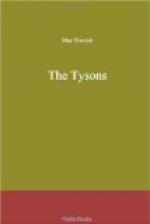“Good God, Stanistreet, how white you are! I wish I hadn’t let you in for this. I’m not in the least nervous myself, you know. She’s all right. Thompson says so. I’m awfully sorry for the poor little soul, but if you come to think of it, it’s the most natural and ordinary thing in the world.”
But Stanistreet’s thoughts were back in yesterday. He could see nothing, think of nothing but the little figure going through the doorway, and laughing as it went.
“Do you mind not talking about it?” said he.
Tyson sat quiet for a while, except when some obscure movement overhead roused him from his philosophic calm. Towards midnight Mrs. Wilcox came to the door and spoke to him for a minute. After that he became thoughtful. “I don’t quite like the look of it,” said he; “he’s sent for Baker of Drayton—I suppose it means that the idiot has just sense enough not to trust his own judgment. But I don’t like it.”
By the time he had struck another attitude, lit another cigar, and gulped down another tumbler of whiskey-and-soda, philosophic calm gave way to philosophic doubt. “I don’t know who has the management of these things, but what I want to know is—why do they make women like that? Is it justice? Is it even common decency? What do you think?”
Stanistreet moved impatiently. “I don’t think. I’ve no opinion on the subject. And I never interfere between a man and his Maker—it’s bad form. They must settle it between them.”
“It’s all very well to be so infernally polite. But this sort of thing wakes you up impolitely, and makes you ask impolite questions. I suppose I’ve seen men die by dozens—so have you—seen them die as if they enjoyed it, and seen them foaming at the mouth, kicking against death—and I can’t say it particularly staggered my belief in my Maker. But when it comes to the women, somehow it seems more polite not to believe in him than to believe that he does these damnable things on purpose.”
Stanistreet closed his eyes to shut out the sight of Tyson and his eternal cigar, and the slow monotonous movement of his lips. His friend’s theological views were not exactly the supreme interest of the moment.
“Down there in the desert” (Tyson seemed to dream as he raised his eyes to the great map of the Soudan that hung above the chimney-piece), “where there’s no end to the sand and the sky, and man’s nothing and woman less than nothing, this curious belief in the infinite seems the natural thing; it simply possesses you. You know the feeling? But here it gets crowded out somehow; it’s too big for these little houses we’ve got to live in, and work in, and die in. It’s beastly business thinking, though. I fancy old Tennyson got very near the mark—
“’Perplexed in faith, but pure in deeds.
At last he beat his music out;
There lives more faith in honest
doubt,
Believe me, than in half—’”




